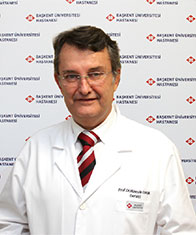Geriatricians are internists who have special knowledge of the aging process and special skills in the diagnostic, therapeutic, preventive and rehabilitative aspects of illness in the elderly. This specialist cares for geriatric patients in the office, long-term care settings such as nursing homes, and the hospital.
Geriatrics is the branch of medicine that focuses on health promotion, prevention, and diagnosis and treatment of disease and disability in older adults. Recent studies have shown that geriatricians are among the most satisfied of physicians when it comes to their career choice. The specialty offers a wide diversity of career choices and is a clinically and intellectually rewarding discipline given the medical complexity of older adults. Geriatricians reap the rewards of making a difference in a patient’s level of independence, well-being and quality of life. With the rapid growth of the older population in the Turkey, there is a pressing demand for physicians with specialized training in geriatrics, providing geriatricians with unlimited career opportunities.
Geriatricians are known for treating the whole person—managing adult medical conditions as well as treating patients with one or more geriatric syndromes such as falls, delirium, dementia, malnutrition, incontinence or polypharmacy. They are trained to diagnose conditions that often present differently in older adults; develop care plans that address the special health care needs of older adults; communicate with families and other caregivers; be responsible for care coordination across settings; and to take a patient-centered, holistic approach to maintaining older adults’ functional status, independence and quality of life.
Geriatric care is rewarding, as often small improvements in health status can have a tremendous impact on older adults’ quality of life, as well as that of their families and other caregivers.
Geriatrics differs from standard adult medicine because it focuses on the unique needs of the elderly person. The aged body is different physiologically from the younger adult body, and during old age, the decline of various organ systems becomes manifest. Previous health issues and lifestyle choices produce a different constellation of diseases and symptoms in different people. The appearance of symptoms depends on the remaining healthy reserves in the organs.
Geriatricians distinguish between diseases and the effects of normal aging. For example, renal impairment may be a part of aging, but renal failure and urinary incontinence are not. Geriatricians aim to treat diseases that are present and achieve healthy aging. Geriatricians focus on achieving the patient's highest priorities in the context of multiple chronic conditions, and on preserving function.
The decline in physiological reserve in organs makes the elderly develop some kinds of diseases and have more complications from mild problems (such as dehydration from a mild gastroenteritis). Multiple problems may compound: A mild fever in elderly persons may cause confusion, which may lead to a fall and to a fracture of the neck of the femur ("broken hip").
Elderly people require specific attention to medications. Elderly people particularly are subjected to polypharmacy (taking multiple medications). Some elderly people have multiple medical disorders; some have self-prescribed many herbal medications and over-the-counter drugs. This polypharmacy may increase the risk of drug interactions or adverse drug reactions. Drugs metabolites are excreted mostly by the kidneys or the liver, which may be impaired in the elderly, necessitating medication adjustment.
The presentation of disease in elderly persons may be vague and non-specific, or it may include delirium or falls. (Pneumonia, for example, may present with low-grade fever and confusion, rather than the high fever and cough seen in younger people.) Some elderly people may find it hard to describe their symptoms in words, especially if the disease is causing confusion, or if they have cognitive impairment. Delirium in the elderly may be caused by a minor problem such as constipation or by something as serious and life-threatening as a heart attack. Many of these problems are treatable, if the root cause can be discovered.
The so-called geriatric giants are the major categories of impairment that appear in elderly people, especially as they begin to fail. These include immobility, instability, incontinence and impaired intellect/memory.
Functional abilities, independence and quality of life issues are of great concern to geriatricians and their patients. Elderly people generally want to live independently as long as possible, which requires them to be able to engage in self-care and other activities of daily living. A geriatrician may be able to provide information about elder care options, and refers people to home care services, skilled nursing facilities, assisted living facilities, and hospice as appropriate.
Geriatricians work closely with interdisciplinary teams, an approach that is taking on greater prominence and importance with changes in our health care workforce. Often, members of the team are health professionals who also have specialized training in the care of older adults, including nurses, psychologist, nutritionists, physical therapists and occupational therapists.
In collaboration with the geriatrics team, geriatricians look at many aspects of the patient’s life, including evaluating a person’s ability to perform activities of daily living, the social support available to a patient, and his or her living and community conditions.
